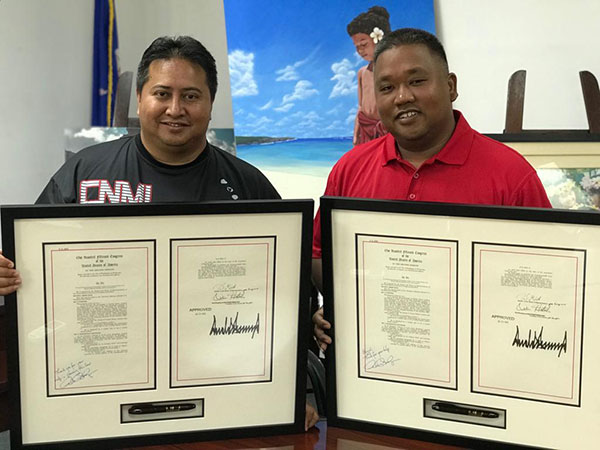Torres, Demapan receive Workforce Act redline, pen

Gov. Ralph DLG Torres, left, and Rep. Angel A. Demapan display the congressional redline of the NMI US Workforce Act of 2018 and the pen President Donald J. Trump used to sign the legislation. (Contributed Photo)
Gov. Ralph DLG Torres and Rep. Angel A. Demapan (R-Saipan) received Sunday the official congressional redline of the NMI U.S. Workforce Act of 2018 from House Natural Resources Committee chair Rep. Rob Bishop and the pen President Donald J. Trump used to sign the legislation.
“I am honored to have received the official framed copy of the NMI Workforce Act of 2018 with the actual signing pen used by President Donald J. Trump on Air Force One, where he signed the bill in July,” said Torres. “…Bishop, who was the primary author of the bill, asked to personally sign the redline copies as a thank you to [Rep.] Angel Demapan and I for our efforts with our business partners in securing passage of this important legislation for our economy.”
Demapan separately thanked Bishop, saying it was a privilege to have worked with Bishop, Torres, and members of the CNMI business community “to get a bill passed into law that would help save our economy.”
In December 2017, Torres, along with members of the Northern Marianas Business Alliance Corp., met with Sen. Lisa Murkowski and members of the working group to help move the bill further. Following the December meeting, Torres worked with the working group, resulting in the introduction of S. 2325 in January 2018.
The Office of the Governor and the Senate Committee on Energy and Natural Resources remained in direct communication after the introduction of the bill and through the Senate hearing of the bill on Feb. 6, 2018.
Torres, joined by Demapan, also met with senators on the committee and the Office of Speaker Paul Ryan about the bill.
While two bills were co-introduced in both the House and the Senate, it was only S. 2325 that was amended to reflect new language that directly addressed the needs of the CNMI. As a result, Murkowski’s bill became the primary piece of legislation.
In late February, Torres invited Murkowski to the CNMI for a firsthand view of the CNMI economy. Murkowski’s visit in March helped provide a clear picture of the CNMI economy and its challenges toward even greater levels of success in the CNMI. This eventually led to the passage of S. 2325 in the Senate in April.
After a parliamentary concern over the bill’s revenue provisions within the anti-fraud fee, Bishop re-introduced the bill in the House in late May as H.R. 5956.
“Since all revenue- generating bills must originate in the House, the language was then fully incorporated into this new version so that we can get it through the House as soon as possible then onto the Senate,” said a statement from the Office of the Governor.
The bill was also renamed to include “of 2018” in the short title to distinguish it from the various other versions of the bill floating around Congress.
H.R. 5956 includes the original text of the recently passed S. 2325 in the Senate, along with the blue-slipped language negotiated by the Office of the Governor, the Office of Sen. Murkowski, and the Department of Homeland Security and cleared by the House Committee on Ways and Means.
The Bishop-Murkowski bill then went to the White House on July 13, 2018, for President Trump’s action, which ultimately led to the President signing the bill into law on July 24, 2018.
“During my short time as governor, I’ve learned that nothing ever comes easy. It took a collective effort by an entire community to get it done, despite the uncertainties and roadblocks created by folks that did not want to see us reach this goal or see our economy continue to be viable. This work will always be about advocating for the people in our villages who are actively trying to find a job in our growing economy, our small local businesses that have to make difficult choices, and families and friends that have been affected already. The new law ensures effective wage protection for U.S. workers, an acknowledgement of our long-term guest workers, additional time to allow for the construction and progress of our islands to continue, and stronger safeguards against bad actors in our economy,” said Torres. (PR)



























